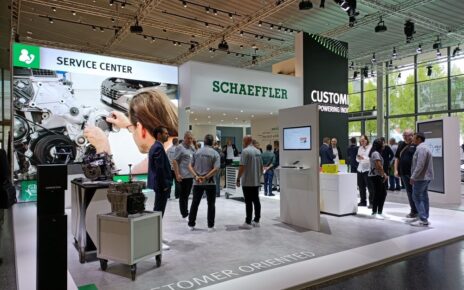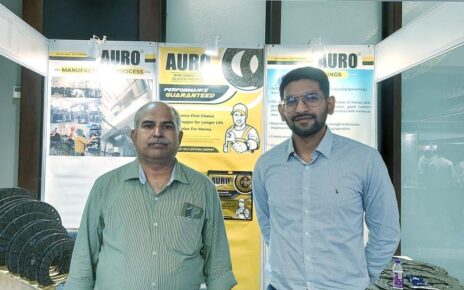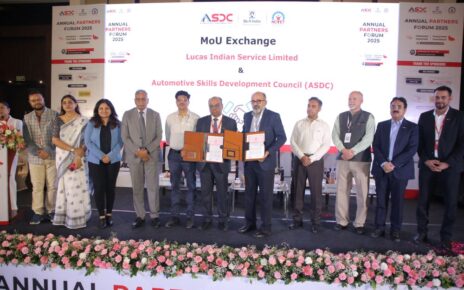
The Indian automotive spareparts market is expected to grow from Rs. 28,000 crores around two years back to Rs. 37,000 crores by 2015, according to a report from consultancy firm McKinsey. The two-wheeler segment is the largest contributor at an estimated Rs. 14,000 crores (49 per cent of the overall market), followed by the car segment at approximately Rs. 7,000 crores (26 per cent), while commercial vehicles, including multi-axle vehicles, light commercial vehicles, buses and trailers account for the remaining 25 per cent of the market.

General Patters Road (GP Road) in Chennai has been a hub of bustling aftermarket activity and, for over five decades, some of the most popular names in the Indian automotive industry like TVS, Addisons, Royal Enfield, South India Automotive Company, Simpsons and George Oakes (both part of the Amalgamations Group), and Standard Motor Products of India have had their offices on Mount Road which was and still continues to be one of the most active centres in Chennai. GP Road houses thousands of automotive spareparts retailers and shops offering vehicle accessories and is one of the major aftermarket locations in Tamil Nadu.
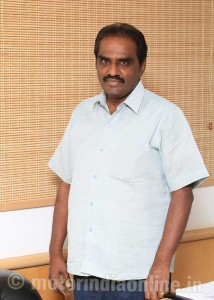
We recently paid a visit to the location to get a pulse of the aftermarket, even as the automotive industry, especially the commercial vehicle segment, crawls its way back to normalcy after passing through a recessionary phase.
Following the upswing during 2011, the CV segment went through a severe slowdown, recording negative sales growth for close to two years until the free fall was halted in September this year. The aftermarket has managed to hold its own during this period and, more importantly, has evolved as a much more organized sector as well. In the last decade, new generation vehicles have entered the market and, as a result, the aftermarket has also geared up with high quality parts and components to support the modern vehicle platforms. There is also growing focus on a more organized and structured aftermarket trade from top names in the component industry which is helping the segment evolve faster.
Federal-Mogul Motorparts is a leading provider of premium brands, including Goetze, Glyco, Ferodo and Champion in the Indian aftermarket, apart from offering high-quality pistons, piston rings, engine bearings and spark plugs to OEMs. The company’s focus on the aftermarket is a typical example of a global leader working dedicatedly to making the Indian aftersales trade more organized through closer ties with distributors, retailers and the end consumers.
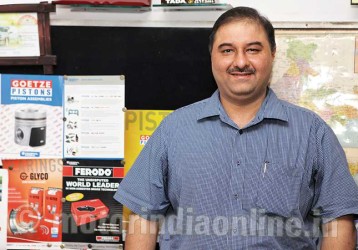
Says Mr. R. Vetrivel Raaja, Director, Rameswar Auto Electrical (P) Ltd.: “Federal Mogul Motorparts is one of the fastest growing companies in terms of market share and product portfolio in the aftermarket business in India. In this current market scenario, where the market is tough, their approach to move closer to the customer is really encouraging. While their introduction of new product categories is highly regarded, they should also plan to have significant man power at the grass root level to support the cause. We feel proud to be associated with Federal Mogul and hope to grow with them.”
Rameswar Auto is a leading distributor of automobile replacement parts in the country. One of Federal Mogul’s key distributors in Chennai, it has been in the automotive aftermarket industry for over 30 years and serves nearly 3,000 retailers in Tamil Nadu with timely delivery and genuine parts.
Taking a closer look at the market scene, the M&HCV segment is down by around 40 to 50 per cent, while passenger cars are slightly better off, down only by 20 to 30 per cent in the current year. The two-wheeler segment has been the saving grace for many, growing by around 25 per cent. While the slowdown is a national phenomenon, each State has its own concerns which the local Government has to tackle.
Expressing his views, Mr. Rajesh L. Nichani, Partner, Kishandas Gobindram, says: “The aftermarket situation is quite challenging at the moment. Though the sentiments have got better in the automotive industry since the new government took over, a lot of things have to happen at the ground level. The Centre’s action is certainly important, but a lot depends on the State Government as well for our region to progress. Quarrying of sand, mineral and granite have to open up, for which infrastructure development is indispensable. There have been some positives like the reduction in oil prices which will surely help the CV segment, but the government has to loosen its purse strings to develop infrastructure to improve the situation.”
Kishandas Gobindram (KG) is a reputed distributor of a range of automotive and tractor parts, including Federal-Mogul brands such as Goetze, Champion, Glyco and Ferodo, among many other brands. A major share of KG’s business comes from products of Federal-Mogul such as piston rings, bearings, etc., with the association being nearly 35 years old. “We have been fortunate to work with Federal-Mogul and are thankful to them for their support. They believe in price and distribution stability which is good for everyone”, he states.
At present, all of Federal-Mogul’s products are performing quite well with its Ferodo brand of CV linings, brake pads and brake fluids in particular growing in popularity. Federal-Mogul also has a manufacturing facility in Chennai where it turns out braking and friction products.
Quality improvement
Apart from the recession, another factor which has brought about a paradigm shift in the aftermarket is the improvement in quality and penetration of electronics and technology in both vehicles and components. The improved life cycle of products, coupled with increase in service intervals in the last decade, means less frequent visits to workshops for repair and service and also lower volume of parts sold as replacement. This has helped the aftermarket become more quality and system oriented, also leading to consolidation of smaller players wanting to stay in the game.
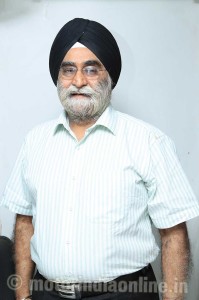
“The quality of components and vehicles has improved tremendously over the last decade. The vehicle manufacturers now give a four to five-year warranty which keeps the vehicle owners within their grasp. Even after the engine lifecycle is over, reconditioned engines are offered with a six-month to one-year warranty which is good enough for customers because it comes from the OEM”, he adds.
Says Mr. Harbhajan Singh Suri, Managing Partner, Presidency Motors: “Until around 1998, the engines used to last for a maximum of 1,00,000 km, whereas now the average life is 4,00,000 to 5,00,000 km which is a huge leap. The brighter side is that, though the frequency of vehicles coming for service has reduced, the number of vehicles has gone up considerably, benefiting the aftermarket.”
Presidency Motors is one of the leading distributors on GP Road, with about 300 dealers in Tamil Nadu. The firm earns 90 per cent of its revenue from the CV segment, with the balance from other segments, mainly passenger cars.
The distributor has been with Federal-Mogul for close to three decades and has built the brand strongly in the southern market. “We have the Goetze, Ferodo and Glyco brands from Federal-Mogul. For the Goetze brand, as far as M&HCV trucks are concerned, one of our competitors entered the market before us. But over the last two to three years, we have been really making a dent and have become No.1 in Chennai and a few other areas, while we are No.2 and growing in others parts of the State. In LCVs and cars, we have a clear monopoly in the State. The Ferodo and Glyco brands are also doing well and are growing fast in the region,” adds Mr. Suri.
Impact of technology
The quality of lubricants in the market has gone up multifold which has, in turn, led to better maintenance of engines by customers. Also, since the engine costs have gone up due to the quality and performance, customers have started focusing more on maintenance so that they would not have to replace the parts more often. Customers, especially large fleet operators, have realised that better maintenance leads to better vehicle life which, in turn, results in better savings in the long run.
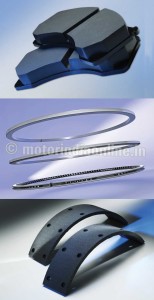
Another influential aspect has been the growing focus of vehicle OEMs on their own spareparts business. This has been triggered by the huge potential the spareparts business offers and also due to the growing use of electronics and technology in products. This calls for roadside mechanics upgrading their skills to handle servicing efficiently. “The penetration of technology, as seen in IC-controlled engines, will impact the aftermarket, as roadside mechanics will have to upscale their skills to be able to service such products. In the new-generation vehicles, even brake linings, brake pads and oil filters now come with sensors. This clearly indicates that electronics will play a major role in future”, says Mr. Nichani.
“Electronics has made a big impact on our trade. It will take around 5 to 6 years for the technology to penetrate fully, but the whole service infrastructure has to be ready. The change is so rapid that people who adapt to it will survive, while others will have to retire. We will see a more organized aftermarket in the coming years with the larger players going strong, while the smaller ones will have to consolidate”, quips Mr. Suri.
The improvement in quality of components and growing technology application has brought about another positive change in the aftermarket. The grey market comprising spurious parts has been a major threat for the aftermarket over the years, but the situation seems to be changing for the good. As the products and components have become more advanced, the possibility and ease for duplication have gone down proportionally. “Counterfeits have come down drastically in the last few years. Our range of products are highly sophisticated and need a certain level of machinery and investment to manufacture. Hence it is not easy to duplicate them”, adds Mr. Nichani with a smile.
Mr. Suri who too feels that the threat of counterfeits has reduced comments: “We do not find too many spurious parts now, because it is prevalent mainly when the availability of original parts is low. The practice might still prevail in smaller towns and villages where proper access to parts is a major concern and consumer awareness is low. But in cities, education has helped a lot, and the consumers are very much aware of the difference between original and spurious parts.”

The growth of the aftermarket sector in South India can also be attributed to the efforts made by the Madras Motor Parts Dealers Association (MMPDA) which is an apex body representing automobile spareparts dealers in Chennai. With over 550 members, the Association has proved a major mouthpiece representing the various issues related to its members and also helping the sector become more organized and transparent.



